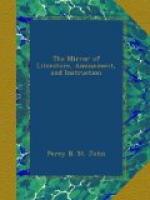Influence of Christianity.
Before a century had elapsed, Christianity was firmly and sincerely believed throughout Anglo-Saxon Britain; and, in the state of society which then prevailed, the establishment of the true religion became the means of conferring the greatest temporal advantages upon the community. A large proportion of the population consisted either of slaves or of churls or of villains, who were compelled to till the ground for the benefit of their masters. These classes immediately gained the comfort of rest, one day in seven; and they whose labour had hitherto been unremitted, without any pause, except when fainting nature sunk under incessant toil, could now expect the Sabbath of the Lord, as a day of holiness and of repose. So strictly did the temporal laws protect the observance of the seventh day, the right and privilege of the poor, that the master who compelled his slave to work on the Sunday, was deprived of the means of abusing his power,—the slave obtained his freedom.
A tenth part of the produce of the land was set apart for the maintenance of the clergy, and the support of the destitute. Charity, when resulting from the unaided impulses of humanity, has no permanence. Bestowed merely to relieve ourselves from the painful sight of misery, the virtue blesses neither the giver nor the receiver. But proceeding from the love of God, it is steady and uniform in its operation, not wayward, not lukewarm, not affected by starts and fancies, and ministering to more than the bodily wants of those who are in need.
Paupers, such as we now see, then rarely existed. Bad as it was, the system of slavery had given a house and a home to the great mass of the lowest orders. And the laws, which placed the middling classes under the protection, and at the same time under the control of the more powerful, prevented all such as really belonged to society, from experiencing any severe privations in those years when the people were not visited by any particular misfortunes. But mankind were then subjected to many calamities, which have been moderated in our times. If crops failed, and the earth did not bring forth her fruit, vessels




